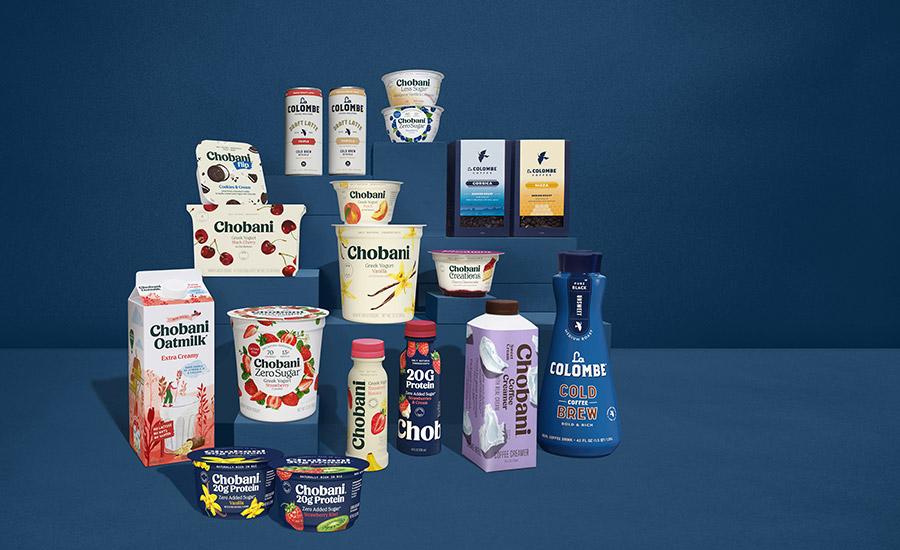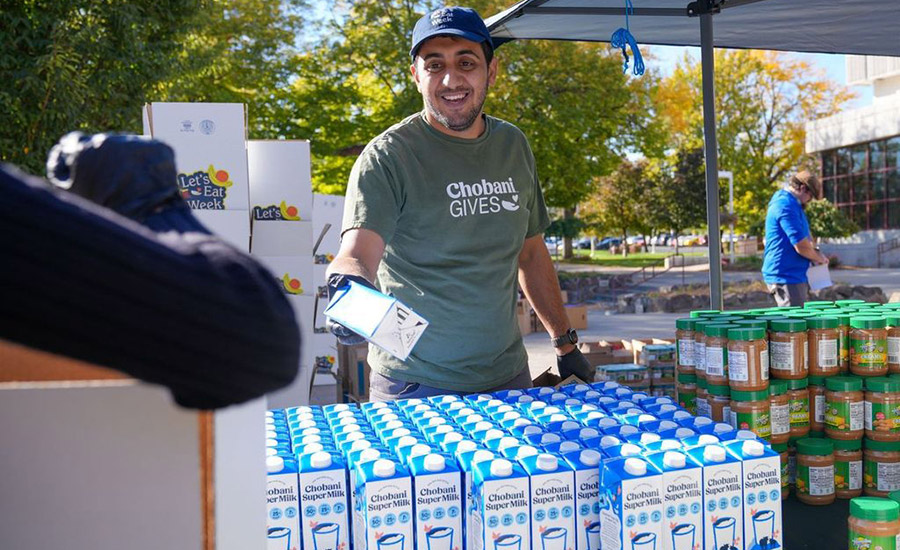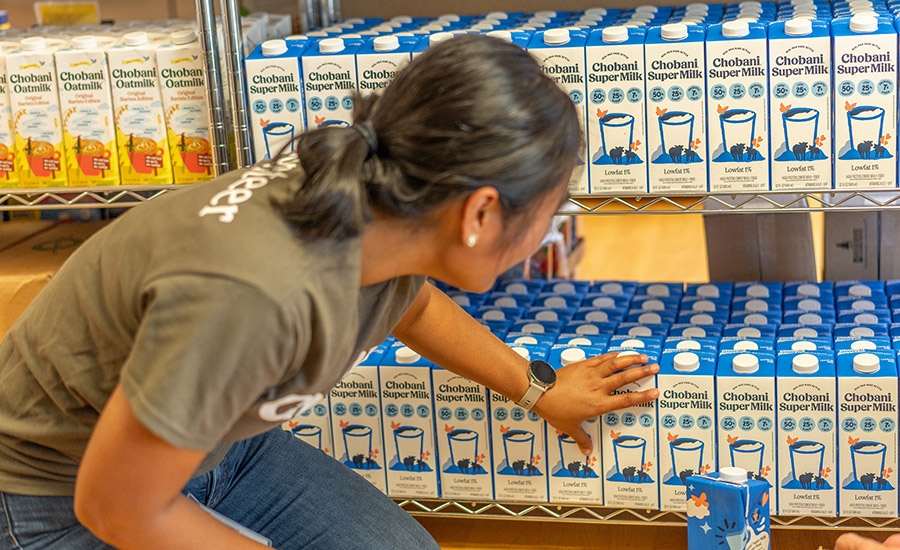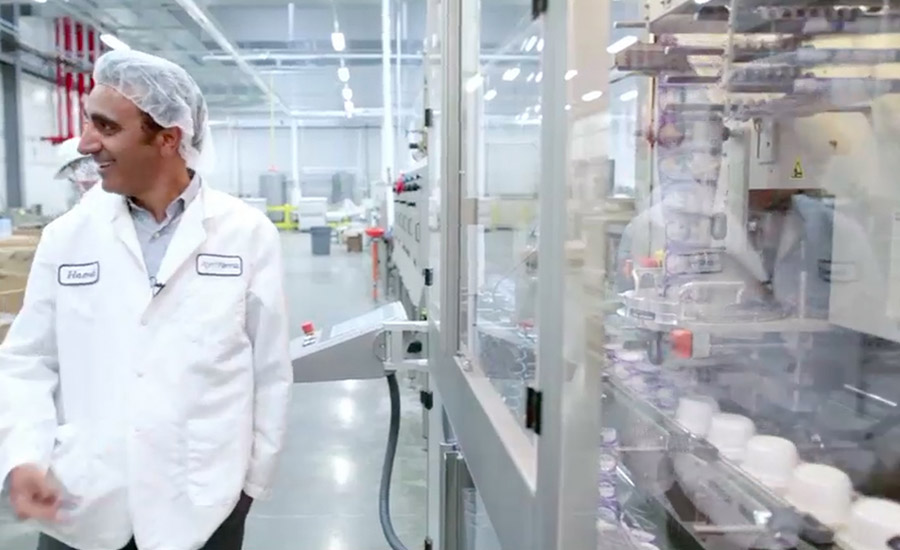Dairy Foods names Chobani 2024 Processor of the Year
Cultured dairy brand makes huge humanitarian strides and moves into new dairy and RTD coffee segments.

Chobani continues to grow, including its acquisition of La Colombe.
Dairy Foods names New York City-based Chobani LLC as its 2024 Processor of the Year, honoring the company’s impressive humanitarian efforts, its entrance into new dairy and non-dairy markets, and its impressive growth.
Founded in 2005, Chobani, then and now, is headquartered in New York City — the site of its new 22-story global business, Chobani House, which will be about much more than just the Greek yogurt business the company is famous for.
In 2007, the first Greek Yogurt cup was sold at a convenience store in Great Neck, N.Y. And no matter how much Greek Yogurt Chobani shipped to that retailer, the product kept flying off the shelves. That’s when Chobani’s Founder and CEO Hamdi Ulukaya knew he had developed something special.
Ulukaya grew up in eastern Turkey, where yogurt was a staple at every meal, whether breakfast, lunch or dinner. In 2005, there was minimal, if any, Greek Yogurt in North America, Nishant Roy, Chobani’s chief impact officer, tells Dairy Foods during a visit to Chobani’s office in New York City’s SoHo neighborhood.
“Traditional yogurts 20 years ago were catering to the American taste buds that were trained to want and enjoy sweeter options,” notes Roy, who has served the company for more than seven years and whose team’s role is to influence better products that are more nutrient dense and sustainable, while improving food access throughout many communities. “Our Greek Yogurt introduced a better choice, with the idea that people have great taste but they needed great options.”
Creating healthy cultured dairy products with less sugar has been part of Chobani’s mission since its inception. Today, a yogurt cup, on average, contains about 20 grams of sugar. “If you ask what has changed during that time, a lot of it is the influence of Chobani,” Roy states. “If you look at Nielsen data, we are responsible for about 23%[1] of the entire yogurt market, and are No. 1 in Greek Yogurt. Considering our growth, I believe we have shown that it is possible to succeed with healthy offerings in the yogurt category. We have also inspired many competitors to not only meet our nutritionals, but to try and beat our nutritionals.”
Humanitarian efforts
Chobani has certainly had a positive influence on yogurt products, especially when it comes to health and wellness benefits. Internally, Chobani uses the acronym NNDA, which stands for Natural, Nutritious, Delicious and Accessible. The first three parts of the acronym may be easy to decipher the meaning. Regarding Accessible, Chobani is referring to not only having the product available on store shelves, but at an affordable price point.
Once Chobani was able to change the Greek Yogurt and cultured dairy business forever, it turned its focus on even deeper issues affecting Americans. One effort has been supporting the military. Chobani launched a product called the Hero Batch, which brings to light the fact that one in four members of the military qualify for food stamps.
“Many members of the military have difficulty accessing nutritious food. During the time of our partnership with Operation Homefront, Chobani donated about $4 million,” Roy, himself a military veteran, asserts. “We have used our brand in a very authentic way to highlight an issue and also support an organization.”
Chobani definitely does not stop there. It has provided a multitude of support for refugees and immigrants. Today, Chobani proudly employs hundreds of refugees and immigrants. "This is something near and dear to Hamdi [Ulukaya],” Roy states. “Hamdi came to this country in 1994. He just wanted to learn English, but nobody was there to help him along the way. So, he made it a point to help others facing these challenges.”
Raising its efforts another notch, Chobani has stressed the importance of helping local communities. One big place it knew it could provide assistance regards hunger, something that continues to rise in America, especially as food prices continue to rise.

“What positions us uniquely is we are no longer just a yogurt business. We are working with retail partners to make food more accessible to those in food deserts, as well as 41 local food pantries in upstate New York and 30 pantries in Idaho to get more fresh, nutritious food out to those who need it most,” Roy reveals.
In speaking to local food pantries, Chobani also learned about a significant problem: lack of refrigeration in these locations. This led to Chobani creating an aseptic, shelf-stable milk, called Chobani Super Milk[2], which has 50% more protein and 25% less sugar than other milk, and which contains galacto-oligosaccharide (GOS), a prebiotic fiber. And you will not find Chobani Super Milk in stores: Chobani manufactures the product for donation only, deploying it to communities who need it most.
“We have been able to donate Super Milk to those who are experiencing food insecurity in our central New York and southern Idaho communities, as well as those impacted by natural disasters. In addition to local food pantries, we partnered with the American Red Cross on these efforts,” Roy notes.
“According to the American Red Cross, in the last five years, we have had about 20 major multi-billion-dollar disasters. Unfortunately, for people affected by these tragedies, it can be difficult to access the necessary nutrition. When they heard about Super Milk, they fast-tracked our partnership,” states Roy, wearing a Super Milk hat during our interview. “We launched the partnership in July, and we’ve donated a substantial amount of Super Milk product since then.”
After Hurrican Helene struck, Roy went with a team to North Carolina, where he discovered that one of the biggest food pantries, which serves 16 counties in North Carolina, was destroyed. Hence, it took over an old FedEx location instead.

“One of the first products they served to the community was Chobani Super Milk. The same was true in Florida after Hurricane Milton,” Roy proudly states. “We deployed two truckloads of Super Milk, which equals over 35,000 individual cartons.
“We also teamed with retail partners like Kroger and Walmart to get more product to Florida communities as well,” he continues. “Overall, more than 300,000 cartons of Super Milk have been deployed since July across nine states.”
Yogurt and beyond
Dairy Foods is also honoring Chobani with its Processor of the Year award for its impressive product expansion. But first, Roy provides assurance that the story of Chobani yogurt is nowhere near over.
“There will be many more fun products to come out within the yogurt world,” he says. “One of the coolest things to come out of yogurt is our Zero Sugar product. Some products talk about ‘no-sugar added.’ But Chobani Zero Sugar[3] is unique because it follows a completely natural process. That has been one of our fastest-growing yogurt innovations.”
Roy adds he is enthusiastic about the Chobani Zero Sugar product. Consumers have often complimented Chobani’s impressive record of disrupting the yogurt category, but there is one thing they still desire — protein.
. “One thing we heard is consumers want more protein options. There are a lot of protein powder-based products out there,” Roy notes. “Our yogurt has always been higher in protein, but what we will be offering soon is products with 15, 20, and 30 grams of protein per serving. …This is an exciting platform for us. People can now get a lot more protein in their diets and also get a complete protein.”
Chobani’s chief impact officer adds high-protein diets are not a trend that will fade away soon. Its high-protein yogurt comes at a time when more and more Americans are beginning GLP-1 medication regimens.
“What we are hearing from doctors is people who take GLP-1s are seeing a big muscle-mass decrease. Doctors are recommending more protein and weight-resistance training to offset that,” Roy suggests. “We cannot help with weight-resistance training, but we can certainly offer more protein. Our yogurt is a great way to get it. It is also made with only-natural ingredients and is accessible in terms of a price-point perspective.”

Beyond yogurt, Chobani always tries to meet the needs of its customers, some of whom pointed to lactose-intolerance. Hence, it has successfully added other products to its portfolio, including oatmilk.
“We are now the No. 3 player in the oatmilk market.[4] Because of the power and innovation of Chobani, we were able to get to that standing in record time,” Roy relays. “One of the best use cases for oatmilk is inside coffee, which led us to think about coffee creamers. This year alone, we went from having 2% of the market to now having 7% of the total coffee creamer market,[5] and we continue to grow. Consumers want natural options, and some did not realize competitors were not providing that. Consumers now have a natural, wholesome creamer at their fingertips.”
La Colombe acquisition
Considering Chobani expanded to the oat milk and coffee creamer categories, the next logical step was to acquire a coffee business. The company announced it purchased La Colombe for $900 million on Dec. 15, 2023. On April 11, Chobani introduced its first La Colombe product: an 11-ounce Draft Latte in ready-to-drink (RTD) cans.
Todd Carmichael and JP Iberti founded La Colombe in 1994 in Philadelphia. Both had been baristas on the west coast and arrived in Philadelphia, where Carmichael had his own TV show called “Dangerous Grounds,” where he traveled the world seeking the perfect coffee bean.

“It made tons of sense for us to invest in a vertically operated coffee brand. La Colombe had their own processing plant in Muskegon, Michigan,” Roy mentions. “We source our milk locally and run our entire process.”
A huge majority of Americans consume coffee, and the fastest-growing segment of coffee is RTD beverages, Roy continues. “But there can be 33 grams of sugar or more in an 11 fluid oz RTD coffee. When we launched La Colombe RTD beverages, we made sure we had at least 50% less sugar than other similar products,[6]” he states. “We have about 3% of the RTD coffee market[7] now. And we have a great partner with Keurig Dr Pepper, which can help us get our beverages out to the masses.”
Taking on challenges
Roy concludes that processing natural foods at scale requires a huge investment and a plethora of resources. Chobani now has five plants, four of which are located in the United States and one in Australia, to take on this task, whereby the company can monitor the quality and craftsmanship of its products on a daily basis.
“We were really tested during COVID. So many companies were able to service store shelves then. They had to outsource it,” Roy affirms. “We did not. This is something we take a lot of pride in. Owning your supply chain is critically important.”
Chobani also takes tremendous pride in investing in the communities it serves. This includes providing an excellent benefit package and highly competitive starting wages for its employees. Efforts to find and reward incredible employees has certainly paid off. Chobani is growing at a 19% per-annum clip, something difficult to match among all food processors, he says.
“We are honored to be named Processor of the Year. What makes us unique is vertical integration. We have our own plants. Roy concludes. “Whenever an obstacle gets in our way, such as corrugate prices or milk prices, we find really thoughtful ways to keep the price point at a stable level for our consumers.”
References
- Nielsen Data Total US xAOC for the last 4 weeks w/e 10/26/24
- Chobani Super Milk has 13g protein, 9g sugar, 7g fiber per 8 fl oz; regular lowfat milk has 8g protein, 12g sugar, 0g fiber per 8 fl oz, according to the USDA.
- Not a low calorie food.
- Nielsen Data (Topline Non-dairy Milk) Total US xAOC for the last 52 weeks w/e 10/26/2024
- Nielsen Data (Topline Creamer) Total US xAOC for the last 4 weeks w/e 10/26/2024
- La Colombe dairy-based lattes have 9-15g sugar per 11 fl oz, average ready to drink dairy-based flavored coffee beverages has 33g sugar per 11 fl oz, according to the USDA.
- Nielsen Data Total (Topline RTD Coffee) US xAOC for the last 52 weeks w/e 10/26/2024
Looking for a reprint of this article?
From high-res PDFs to custom plaques, order your copy today!






